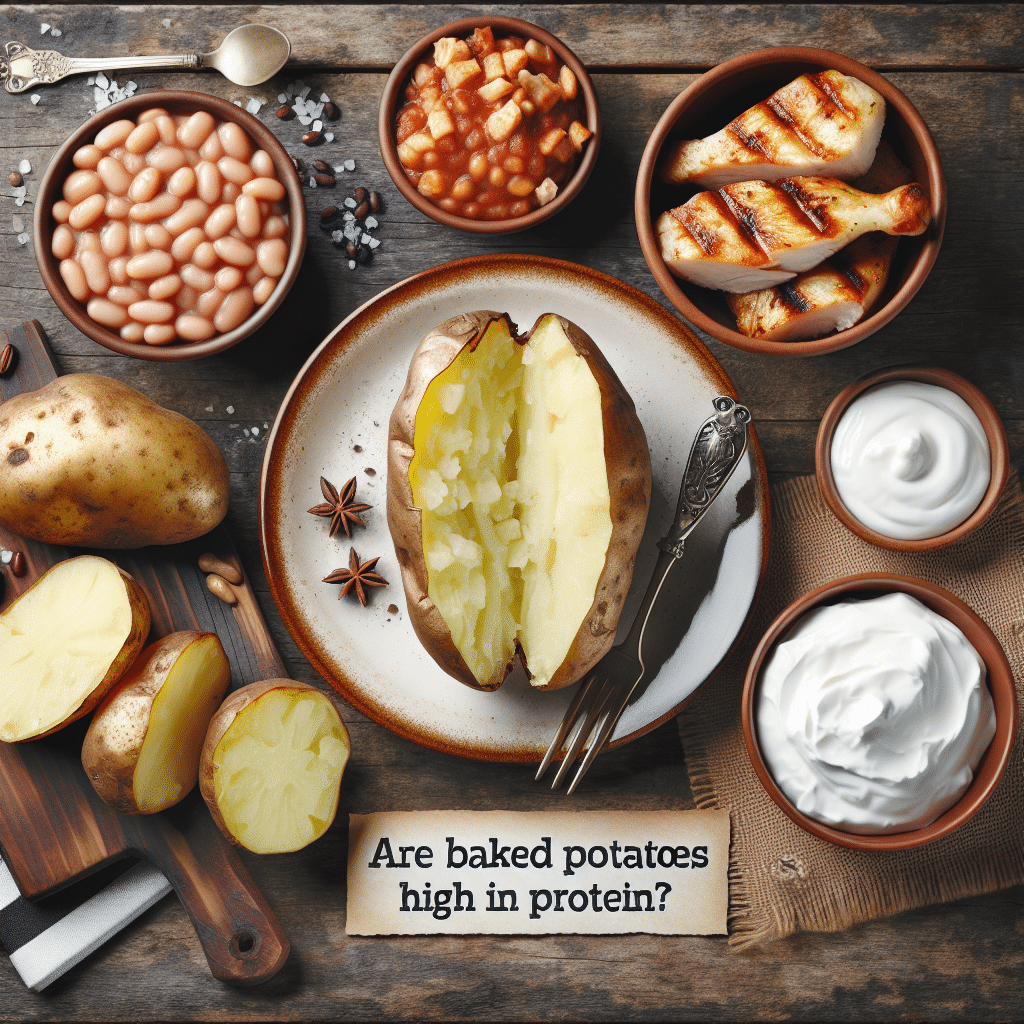Are Baked Potatoes High In Protein?
-
Table of Contents
- Are Baked Potatoes High in Protein? Unveiling the Nutritional Profile
- Understanding the Protein Content in Baked Potatoes
- Comparing Potatoes to Other Protein Sources
- The Role of Baked Potatoes in a Balanced Diet
- Enhancing the Protein Content of Baked Potatoes
- Case Studies and Statistics: The Bigger Picture
- Conclusion: Baked Potatoes in the Protein Puzzle
- Boost Your Protein Intake with ETprotein’s Products
Are Baked Potatoes High in Protein? Unveiling the Nutritional Profile

When it comes to healthy eating, protein is a crucial macronutrient that plays a vital role in building and repairing tissues, making enzymes and hormones, and supporting overall health. While meat, fish, and dairy products are often hailed as high-protein foods, there’s a growing interest in the protein content of plant-based options, such as baked potatoes. In this article, we’ll explore whether baked potatoes are a good source of protein and how they fit into a balanced diet.
Understanding the Protein Content in Baked Potatoes
Protein is an essential component of every cell in the body, and getting enough of it is important for maintaining muscle mass, supporting metabolic processes, and ensuring overall well-being. But are baked potatoes a significant source of this vital nutrient?
Let’s break down the nutritional content of a medium-sized baked potato (approximately 173 grams):
- Calories: 161
- Total Fat: 0.2 grams
- Total Carbohydrates: 36.6 grams
- Dietary Fiber: 3.8 grams
- Sugars: 1.7 grams
- Protein: 4.3 grams
As the data suggests, a medium-sized baked potato contains about 4.3 grams of protein. While this amount contributes to the daily protein intake, potatoes are not considered a high-protein food when compared to other sources like chicken breast, which can provide around 31 grams of protein in a similar-sized serving.
Comparing Potatoes to Other Protein Sources
When evaluating the protein quality of baked potatoes, it’s important to consider the concept of ‘complete’ and ‘incomplete’ proteins. Animal-based proteins are typically ‘complete,’ meaning they contain all nine essential amino acids that the body cannot produce on its own. Plant-based proteins, on the other hand, often lack one or more of these essential amino acids, making them ‘incomplete.’
Potatoes contain all nine essential amino acids, but the levels of some, like lysine, are lower than what is considered ideal. Therefore, while potatoes do provide protein, they should be paired with other protein sources to ensure a balanced intake of all essential amino acids.
The Role of Baked Potatoes in a Balanced Diet
Baked potatoes can be part of a healthy and balanced diet when consumed in moderation and as part of a meal that includes other protein sources. They are also rich in other nutrients that contribute to overall health:
- Vitamin C: Potatoes are a good source of vitamin C, which is important for immune function and skin health.
- Potassium: They are high in potassium, which is essential for maintaining normal blood pressure and heart function.
- Fiber: With a decent amount of dietary fiber, baked potatoes can help promote digestive health and may aid in weight management.
It’s also worth noting that the way potatoes are prepared can significantly affect their nutritional value. Baking is a healthier cooking method that preserves most of the potato’s nutrients without adding extra fat or calories.
Enhancing the Protein Content of Baked Potatoes
While baked potatoes alone are not high in protein, they can be easily transformed into a protein-rich meal with the addition of other ingredients. Here are some ideas:
- Top your baked potato with a dollop of Greek yogurt and a sprinkle of chives for added protein and flavor.
- Stuff your potato with a mixture of black beans, corn, and shredded cheese for a Tex-Mex twist that boosts protein content.
- Combine your baked potato with a serving of cottage cheese and fresh herbs for a protein-packed and satisfying meal.
Case Studies and Statistics: The Bigger Picture
Research has shown that diets rich in plant-based foods, including potatoes, can be associated with a lower risk of chronic diseases such as heart disease and diabetes. A study published in the Journal of the American College of Nutrition found that individuals who consumed potatoes had higher intakes of fiber, vitamins, and minerals compared to those who did not.
Furthermore, the United States Department of Agriculture (USDA) recommends that adults consume 46 to 56 grams of protein per day, depending on age and sex. A baked potato contributes to this daily requirement, but it should be complemented with other protein sources to meet the recommended intake.
Conclusion: Baked Potatoes in the Protein Puzzle
In conclusion, while baked potatoes are not high in protein, they do contribute to the daily protein intake and offer other nutritional benefits. They can be part of a balanced diet when combined with other protein-rich foods. For those looking to increase their protein consumption, focusing on a variety of sources, including both animal and plant-based options, is key to achieving a well-rounded nutritional profile.
Boost Your Protein Intake with ETprotein’s Products
If you’re looking to supplement your diet with additional protein, ETprotein offers a range of high-quality organic bulk vegan proteins that can help you meet your nutritional goals. Their products, including rice protein, pea protein, and various seed proteins, are non-GMO, allergen-free, and feature a neutral taste, making them an excellent addition to any meal or snack.
Whether you’re involved in sports nutrition, weight management, or simply seeking to enhance your overall health and wellness, ETprotein’s offerings can provide the protein boost you need. With their commitment to quality and customer satisfaction, ETprotein is a trusted partner for all your protein needs.
About ETprotein:
ETprotein, a reputable protein and L-(+)-Ergothioneine (EGT) Chinese factory manufacturer and supplier, is renowned for producing, stocking, exporting, and delivering the highest quality organic bulk vegan proteins and L-(+)-Ergothioneine. They include Organic rice protein, clear rice protein, pea protein, clear pea protein, watermelon seed protein, pumpkin seed protein, sunflower seed protein, mung bean protein, peanut protein, and L-(+)-Ergothioneine EGT Pharmaceutical grade, L-(+)-Ergothioneine EGT food grade, L-(+)-Ergothioneine EGT cosmetic grade, L-(+)-Ergothioneine EGT reference grade and L-(+)-Ergothioneine EGT standard. Their offerings, characterized by a neutral taste, non-GMO, allergen-free attributes, with L-(+)-Ergothioneine purity over 98%, 99%, cater to a diverse range of industries. They serve nutraceutical, pharmaceutical, cosmeceutical, veterinary, as well as food and beverage finished product distributors, traders, and manufacturers across Europe, USA, Canada, Australia, Thailand, Japan, Korea, Brazil, and Chile, among others.
ETprotein specialization includes exporting and delivering tailor-made protein powder and finished nutritional supplements. Their extensive product range covers sectors like Food and Beverage, Sports Nutrition, Weight Management, Dietary Supplements, Health and Wellness Products, and Infant Formula, ensuring comprehensive solutions to meet all your protein needs.
As a trusted company by leading global food and beverage brands and Fortune 500 companies, ETprotein reinforces China’s reputation in the global arena. For more information or to sample their products, please contact them and email sales(at)ETprotein.com today.












